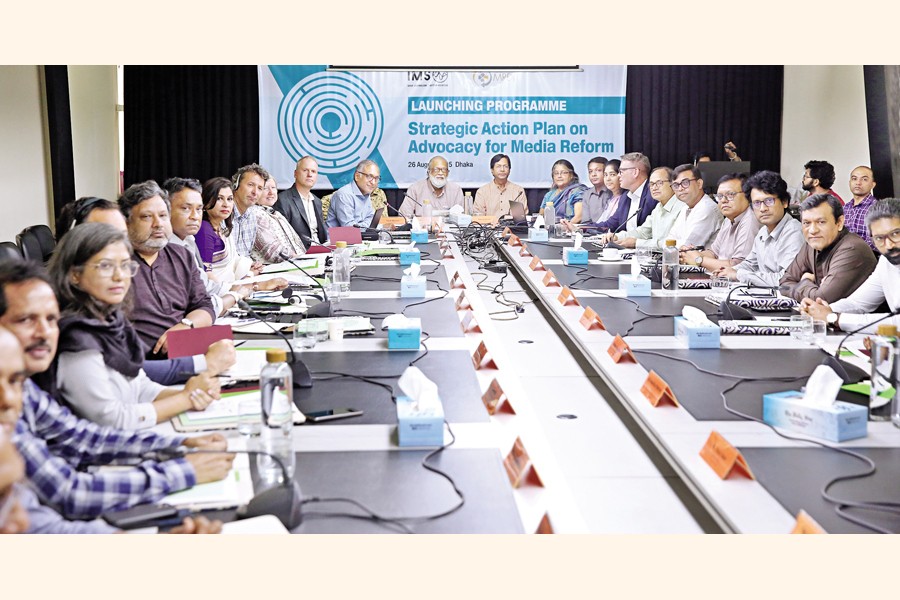
Published :
Updated :

Top editors and senior journalists on Tuesday stressed the need for concerted efforts from all stakeholders to implement the recommendations of the Media Reform Commission, warning that continued inaction would further weaken the country's media landscape.
They stressed the urgent need for collective ownership, sustained efforts, and self-regulation to drive meaningful change in the media sector.
They highlighted that while government support and legal frameworks are important, true reform must be led from within the industry itself, with stakeholders taking responsibility for implementation.
Several speakers underlined the importance of prioritising initiatives, balancing long-term reforms with immediate actionable steps and fostering dialogue, collaboration and accountability across media houses, regulators, and civil society.
Emphasis was also placed on financial sustainability, strengthening public service media, promoting media literacy, and improving journalistic standards through training and mechanisms such as peer review.
However, they expressed disappointment that none of the commission's recommendations had yet been implemented, and urged the government to initiate the process so the next administration could carry forward the reform agenda.
The observations came at the launch of the five-year Strategic Action Plan on Advocacy for Media Reform in Bangladesh (2025-2030) in Dhaka.
The plan, jointly prepared by the Management and Resources Development Initiative (MRDI) and International Media Support (IMS), outlines measures to safeguard press freedom, strengthen accountability, and build a more inclusive and sustainable media sector.
It was developed through stakeholder consultations, desk research, and expert input based on the Media Reform Commission report.
Speaking at the event, Kamal Ahmed, former chairman of the Media Reform Commission, said stakeholders must step up pressure on the government to implement long-awaited reforms, alleging that bureaucratic hurdles continue to stall progress.
He noted that while the government has faced criticism for failing to act on the commission's recommendations, journalist organisations, unions, and other stakeholders have also fallen short in pushing for change.
Criticising recent laws introduced in the name of protecting journalists' rights, he argued that such measures would bring little improvement since many media houses do not even comply with existing labour laws.
Shamsul Huq Zahid, former commission member and Editor of The Financial Express, said newspaper advertisement revenue had fallen by 30 to 40 per cent, making it increasingly difficult to sustain print operations.
He noted that private sector advertising had also declined sharply due to sluggish business activity, while the government had yet to revise its official advertisement rates.
Expressing dismay over the lack of progress in implementing the reform commission's recommendations, he alleged that some recent actions had even gone against the proposals the commission had put forward.
In his opening speech, MRDI Executive Director Hasibur Rahman said the organisation prioritised sustainability, and the action plan was designed to ensure lasting reforms in the media sector.
IMS Regional Director Lars Heiberg Bestle said Bangladesh was at a critical inflection point in its media journey.
"True and lasting change must be driven from within Bangladesh itself," he said.
Lead, Strategic action plan development working group's Afsan Chowdhury urged all stakeholders to persist in their efforts for change, stressing that results would eventually follow.
Fahim Ahmed, former member of the Media Reform Commission and CEO of Jamuna TV, noted that while many discussions were taking place within the consensus commission, they largely focused on political change rather than the implementation of the media reform commission's recommendations.
Anders B. Karlsen, Deputy Head of Mission at the Danish Embassy, emphasised the importance of strong legal frameworks and reliable public service media.
Susan Vize, Head of Office and Representative of UNESCO Dhaka, emphasised the importance of collective ownership and self-regulation in advancing media reforms in Bangladesh.
Kazi Faisal Bin Seraj, Country Representative of The Asia Foundation in Bangladesh, emphasised the need to prioritise and sequence media reform initiatives, noting that while some measures require longer-term efforts, others can be implemented immediately for tangible impact.
Sajjad Sharif, member of the Strategic Action Plan development working group and Executive Editor of The Daily Prothom Alo, said the media sector had been struggling as most outlets were not financially self-sufficient. He urged continued efforts and dialogue to bring about meaningful change.
Faruk Wasif, Director General of the Press Institute of Bangladesh, emphasised the need to expand media literacy and strengthen fact-checking to combat misinformation and disinformation at the grassroots level.
Andreas Sugar, Head of Rapid Response, IMS, Jimi Amir, former member of Media Reform Comission, Qurratul-Ain-Tahmina, Talat Mamun and Nandita Tabassum Khan, Members, Strategic action plan development working group, Mobinul Islam Mobin Editor, Daily Gramer Kagoj, Jashore, Shaifur Rahman Miron, Editor, Daily Vorer Alo, Barishal, and Shameem Ara Sheuli, Country Representative, Internews, Bangladesh, among others, spoke at the event.
bdsmile@gmail.com


 For all latest news, follow The Financial Express Google News channel.
For all latest news, follow The Financial Express Google News channel.